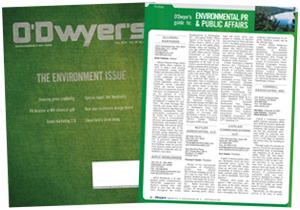|
Story featured in O'Dwyer's Feb. '14 Environmental PR & Public Affairs Magazine |
After a highly publicized legal spat with Verizon, a D.C. Circuit Court of Appeals in January ruled that the FCC doesn’t have the authority to force service providers to abide by its Net Neutrality rules.
The news had the blogosphere in hysterics, with many positing that the ruling has effectively “killed” the Internet, but experts say the Net Neutrality issue isn’t going anywhere. Besides the legal options still available to save it, one of the biggest players in this game — the companies that provide content our service providers rely on — may not allow a “closed” Internet scenario to happen anytime soon.
Net Neutrality, in its most general sense, is simply the idea that the Internet should be a level playing field where all content is treated equally.
In prosaic terms, it means companies who own the “pipes” (service providers like AT&T, Comcast, Time Warner and Verizon) don’t get to control the content that flows through it.
In the near-decade since Net Neutrality entered the national dialogue, we’ve heard doomsday scenarios from Neutrality supporters who claim that without clear rules protecting the Internet, service providers could potentially block sites they don’t like or establish exclusive pay-for-play agreements with content providers, thereby undermining the web’s egalitarian principles and essentially creating a “tiered” Internet that would resemble cable.
Opponents of Net Neutrality claim the Internet has thrived for 20 years without these regulations, and to enact them now would stifle competition and innovation in a market that utilizes a diversifying array of technologies across a growing list of telecommunications services.
The million-dollar question in this debate has always been: given the opportunity, would ISPs deliberately discriminate against or block content?
A common criticism of the pro-Neutrality crowd has been that the arguments of this camp trade in a currency of baseless suppositions, that it would be financial suicide for those who own the pipes to limit consumer choice, thereby potentially driving them to a competing ISP.
How unregulated networks would treat their content ultimately remains to be seen, but it deserves mention that service providers have over-stepped their treatment of content in the past.
Comcast in 2007 was sanctioned by the FCC for “packet forging,” or using data encryption to block user access to popular file-sharing site BitTorrent. AOL in 2006 briefly blocked incoming emails from dearaol.com, a group that opposed the company’s “certified email” policy. Mebane, NC-based ISP Madison River Communications in 2004 allegedly blocked its customers from accessing voice-over IP services from broadband provider Vonage.
Then there was Google’s attempted (and ultimately doomed) wireless partnership with Verizon, wherein the search giant would effectively pay Verizon a fee for the privilege of being the top-tier search engine over the network.
Finally, Verizon attorney Helgi Walker, when asked during September oral arguments if the company would consider charging content providers for faster service, said Verizon “would be exploring those types of arrangements.”
“We should take these companies at their word,” said Craig Aaron, President and CEO of Free Press, an Internet rights advocacy group. “These are the things they’ve talked about at trade shows, and this is exactly what Verizon’s attorney admitted they would do. These companies have lots of plans in the drawer, especially on the wireless side, and I think they’ve been very clear that they want to set up an express lane with ‘special deals’ that give users special access to content. Our argument is that an open Internet frees up competition. Right now, when it comes to content you have a lot of places to choose, but when it comes to the service you have very few. When you allow the company that controls the pipes to dictate content, individual choice goes down. And that’s why we need Net Neutrality.”
Net Neutrality supporters have tried for years to get Congress to pass Neutrality legislation (it almost happened in 2006, in an early draft of the ill-fated COPE Act), but to date the only “rules” we have resembling Net Neutrality are found in the FCC’s Open Internet Order, which is essentially a series of ad hoc Neutrality principles written in 2010 that establish anti-discrimination and transparency guidelines for service providers.
This was the subject of the recent court case, which occurred after Verizon challenged these rules as unenforceable. To be clear: the court didn’t strike down Net Neutrality; it simply said the FCC doesn’t have the authority to stop service providers from blocking content.
Unfortunately, it appears the FCC’s puzzling gap in regulatory authority may have been the Commission’s fault all along.
FCC misclassifies broadband
Up until 2002, broadband Internet access service, like phones, was defined as telecommunications service, covered under Title II of the Communications Act. Title II applies to common carrier companies that provide telecommunications; in the old days it was the portion of the law that said answering machines could be attached to phone lines, or that companies like AT&T had to allow customers a choice of long distance carrier.
In 2002, at the behest of cable companies, then-FCC chairman Michael Powell spearheaded an FCC decision that essentially redefined broadband Internet access service as an information service. Information services are covered under Title I, which has a notably lighter regulatory structure than a telecommunications service provisions of Title II.
Fast-forward to 2007: the FCC repudiates Comcast for blocking user access to BitTorrent. Comcast sues as a result of the FCC sanction, claiming the FCC had stepped outside its authority by dint of the fact that the FCC had exempted broadband transmissions from common carrier rules. And in April 2010, a federal appeals court agreed.
As a means of establishing a Neutrality framework for broadband, the FCC in late 2010 (now under the leadership of then-Chairman Julius Genachowski) wrote its Open Internet Order.
This time Verizon challenged the Commission, essentially making the same case Comcast had laid out several years before: that the FCC has defined broadband service under Title I, so broadband service companies like Comcast are not subject to telecommunications services rules. And for the second time the courts agreed. In reclassifying what broadband service is, the FCC essentially abdicated a great deal of its regulatory power over it.
“It would be like someone saying you can call your dog a cat, and then expressing surprise when your cat barks,” said Aaron.
Legal options available
Experts claim there are several ways Neutrality regulations can be restored in lieu of the FCC’s legal shortcomings.
Neutrality proponents like Free Press have claimed the ideal solution would be for the FCC to go back and reclassify broadband services as a telecommunications service, thereby returning it to the purview of Title II of the Communications Act.
If the FCC did so, however, it would be making an unequivocally political statement, as it undermines former Chairman Powell’s (a Republican) efforts to ease regulations for the broadband industry.
Current FCC Chairman Tom Wheeler, a former cable industry lobbyist, has made no indication that he is interested in taking this route, but released a statement in response to the January 14 ruling, reiterating that he is “pro-open Internet.”
In the same statement, however, Wheeler also made known his pro-market stance, when he wrote that, “it is important not to prohibit or inhibit conduct that is efficiency producing and competition enhancing.”
Wheeler’s devotion to an “open” Internet also sounded notably cavalier during a December question-and-answer session at Ohio State University, where he waxed on a “two-sided market” scenario in which content giants like Netflix offer to pay service providers in exchange for the privilege of transmitting content. “I think we want to let those kinds of things evolve ... the marketplace is where these decisions ought to be made,” he said.
It also deserves mention that the FCC had a chance to reclassify broadband as a telecommunications service after the 2010 court case with Comcast. The Commission didn’t do it then, so why believe it would do it now?
An FCC spokesperson, who did not want to be quoted for this story, told O’Dwyer’s that the Commission is currently reviewing its options, and has not determined what the next course of action will be.
The FCC doesn’t write laws. Like all government agencies, its job is merely to enforce the laws passed by Congress.
The obvious way to resurrect Net Neutrality, others have said, is to have Congress write Neutrality legislation that prohibits the Internet from becoming the cable box of the future. After all, Congress has already given the FCC the authority to regulate service providers, and Congress could reclassify those providers as common carriers if it wanted to.
The problem, of course, is that right now Congress isn’t particularly good at passing anything.
The last time it reformed telephone and broadcasting laws during with the Telecommunications Act of 1996, and the last time a member of the House (Ed Markey (D-Mass.)) tried to attach Neutrality provisions to a bill was during 2006’s COPE Act, where it was stripped out before it even reached the Senate Commerce Committee (where, before dying an untimely death, it was immortalized when Alaska Senator Ted Stevens infamously referred to the Internet as a “series of tubes”).
The point is this: trying to get Net Neutrality laws past legislators who liken marketplace regulations to the bubonic plague is an act far easier said than done.
Finally, the FCC could appeal the January appeals court decision to the Supreme Court. This has been hinted at, but it’s risky, because once the highest court in the land decides the FCC doesn’t have the authority to regulate discrimination over the Internet, there’s no turning back.
It also begs the question: what’s the point in appealing the ruling if everyone agrees the FCC didn’t have the authority to do what they tried to do in the first place?
Content providers could be saving grace
Left with few regulatory options, it appears, as many have long suggested, that the perceived openness of the Internet will be guided by market demand before policy, that the hand most likely to shape the Internet’s future will be less ideological in scope and comprised instead of something far more tenable: money.
And while the media and blogosphere went apoplectic over the news that the FCC can’t use their telecommunications rulebook to prohibit service providers from blocking content, few bothered to consult the party that profits more from the Internet than anyone: the content providers themselves.
In a tiered Internet scenario, it’s content providers like Netflix that would really feel the squeeze. Netflix, which comprises more than 30% of peak Internet traffic in North America, could be forced to pay hundreds of millions to service providers for the bandwidth they use on their networks.
In a January 22 letter attached to the company’s fourth-quarter earnings report, Netflix CEO Reed Hastings told shareholders in no uncertain terms that he’s willing to rally the company’s 33 million subscribers to prevent this scenario from unfolding: “Were this draconian scenario to unfold with some ISP, we would vigorously protest and encourage our members to demand the open Internet they are paying their ISP to deliver,” Hastings said.
It’s not an empty threat. Today’s consumer online programming habits have essentially made the Internet a replacement for television, and increased demand for services like Netflix and Hulu have been single-handedly responsible for an uptick in consumer subscriptions to higher-end broadband plans.
Service providers may very well want to turn the Internet into tomorrow’s cable box, but if Netflix’s recent statement is any indication, they may find themselves waiting indefinitely for the other shoe to drop.
Indeed, it’s risky enough for service providers to galvanize consumers by forcing them to pay for a service that provides limited content; it’s nigh suicidal, however, for service providers to assume those content providers that consumers enjoy would pay for the privilege to stream data on their network as long as competing ISPs remain.
The anti-Neutrality camp is correct in their oft-repeated assertion that this is a “market issue”; it’s becoming increasingly apparent, however, that individual consumer choice will make less of an influence in any closed Internet scenario than high-profile content providers like Netflix who attract a growing share of those Internet users to begin with.
Contrary to what a slew of January editorials claimed, the continued fight over Net Neutrality will most likely not manifest in a push to get the FCC to reclassify broadband or attempts to have Congress pass anything resembling Neutrality legislation.
The real fight over Net Neutrality in 2014 will undoubtedly focus on Internet users trying to find a way to get around the potential barriers erected by service providers, with content providers like Netflix providing a guiding light.
FCC authority remains
Regardless of what the future holds for Net Neutrality, it also deserves mention that while the court ruled the FCC couldn’t stop service providers from discriminating or blocking content, the court upheld the FCC’s authority to adopt rules and to continue regulating broadband.
In other words, the court essentially said that what the FCC did was within their authority — it just didn’t go about using that authority the right way.
The court also left intact one rule of the FCC’s Open Internet Order: the authority to enforce transparency. This means service providers still have to disclose if and when they’re giving preferential treatment to particular data. It might not be ideal, but given the options available, it’s safe to say the Internet isn’t dead yet.



 Maggie Moran, who is well-connected in New Jersey and New York Democratic politics, has established Moxie Strategies in Asbury Park, NJ.
Maggie Moran, who is well-connected in New Jersey and New York Democratic politics, has established Moxie Strategies in Asbury Park, NJ. Husch Blackwell Strategies has added FleishmanHillard alum Michael Slatin as a principal in its public affairs group.
Husch Blackwell Strategies has added FleishmanHillard alum Michael Slatin as a principal in its public affairs group. Rory Cooper, a veteran Republican operative and policy specialist, has joined Teneo’s Washington office as senior managing director in its strategy & communications practice.
Rory Cooper, a veteran Republican operative and policy specialist, has joined Teneo’s Washington office as senior managing director in its strategy & communications practice. Brian Fallon, who served as national press secretary for Hillary Clinton’s 2016 presidential run, is signing on next month as Vice President’s Kamala Harris’ campaign communications director.
Brian Fallon, who served as national press secretary for Hillary Clinton’s 2016 presidential run, is signing on next month as Vice President’s Kamala Harris’ campaign communications director. TikTok is nothing more than a Chinese propaganda tool that poses “a grave threat to America’s national security and, in particular, impressionable children and young adults,” say two Congressmen who want the platform registered as a foreign agent.
TikTok is nothing more than a Chinese propaganda tool that poses “a grave threat to America’s national security and, in particular, impressionable children and young adults,” say two Congressmen who want the platform registered as a foreign agent.


 Have a comment? Send it to
Have a comment? Send it to 
No comments have been submitted for this story yet.